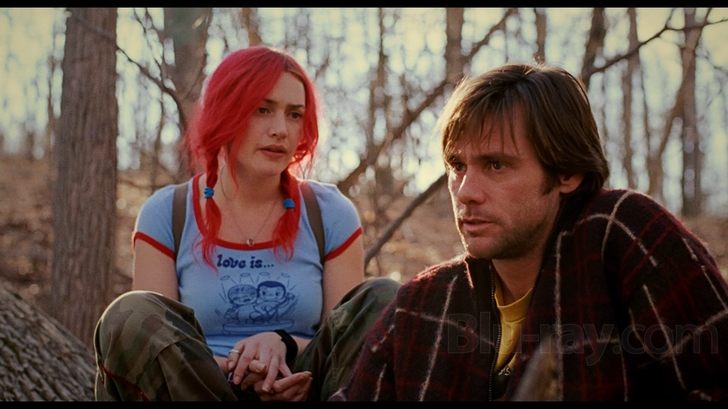Jim Carrey is known for his comedic roles - being in a more thoughtful movie, in which he, of all people, plays an introverted guy with very little social skills and not much of sense of humor, as his female counterpart, Kate Winslet, plays a impulsive risk-taker with bright, colorful hair, is weird. In this drama of sorts, Joel (Jim) and Clementine (Kate) meet, fall in love, break-up (in which they both end up trying to erase each other) and then meet again. (In the movie it's not in chronological order so it can be a bit confusing. In the beginning, when it seems as if Joel and Kate have met for the first time, it is actually there second time together - it seems to be a cycle of sorts.
The movie is largely centered on Joel's personal experience erasing his memories of Clem. From when they first met to their final fight, Joel and Clem have had to make choices that have made them who they end up being. It's because Clem takes risks that makes her impulsive, not the other way around. Same situation for Joel.
Choices, choices, choices. By the end of the movie, they know that their relationship will fail (once they realize that they had chosen to erase their memories of each other and of their relationship problems). But they decide to do so anyways....why so?
When looking at the existentialist themes in the movie, I took into account to ideologies of J. P. Sartre and a film review by Jenni van Wageningen. In this film review can Wageningen says:
"The movie clearly reflects aspects of existentialism which sees people living alienated from each other in an essentially meaningless world. They are responsible for their own actions to shape their own characters and destinies without any certain knowledge of what is right or wrong."By choosing to completely ignore their issues, insecurities and problems they try to erase any recollection of them - momentos, memories, physical belongings. They both run away from each other - as far away as possible. But through searching his memories to erase Clem, Joel realizes that sometimes, it's easier and better to learn to live with those harsh memories than to get rid of them. Memories are memories, and even though some are bad, there are some that are warm and meaningful. After realizing this, he (along with his memory of Clementine) try to stop Dr. Mierzwack and his team (the lab techs) from pinpointing his every thought of her and destroying them.
Although memory erasure can lead to this "eternal happiness of the spotless mind" (as the movie title suggests) it is important to note that this choice can completely derail everything that Joel and Clem stood for: their alienation from this meaningless world. There relationship made their world meaningful. By throwing it away, they are not only ruining a companionship, but both are ruining a part of themselves. To them, existence truly did precede essence. Their choices before, during and after their relationship are a testament to that. By choosing companionship, Clem wasn't as impulsive and Joel wasn't as introverted. Both changed, for the better.
Through a whirlwind of events, and memories within memories, plot twists and more, Eternal Sunshine of the Spotless Mind truly treads deeply into existential topics. Delving into the Sartre-ian values "Choosing one's fate" Joel's and Clem's choice of memory erasure presents a choice that we all need to make (although we do not have the technology to completely erase memories, they can certainly be surpressed) - Do you really want to forget only the bad and keep the good? Or just stick with it all, for the long term?


No comments:
Post a Comment